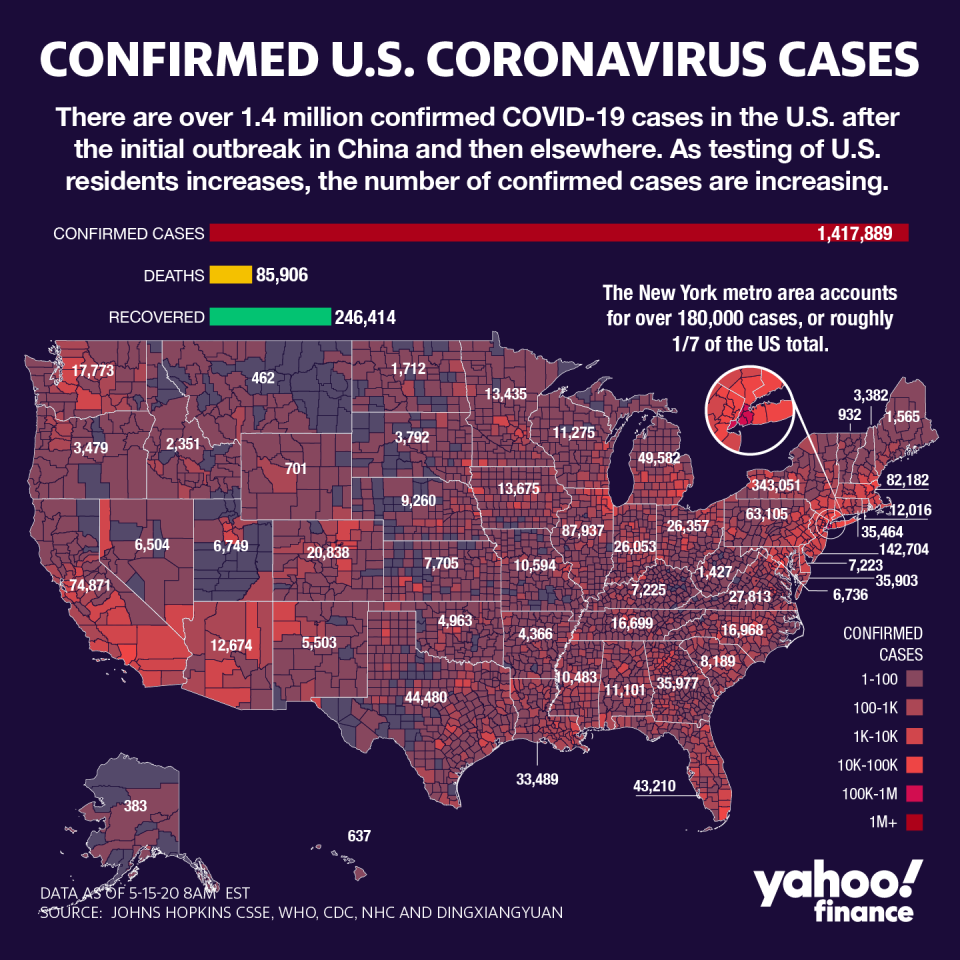‘Dreadful’ April retail sales means Q2 growth may take an even bigger hit
Given the coronavirus’s diffuse impact on the U.S. economy, it was hard to imagine how expectations for U.S. growth could sink any lower. Yet after Friday’s horrific (and historic) 16.4% plunge in April retail sales, those forecasts may fall over a cliff.
The data — which threw into stark relief the effects of restrictive stay-at-home orders that kept consumers at home and most businesses shuttered — has Wall Street economists worried that second quarter (Q2) consumer spending and gross domestic product (GDP) will be even worse.
"The data pushed our Q2 GDP tracker to -42% [on an annualized basis], 2 percentage points lower than our official forecast," Barclays said on Friday.
Consumer spending is the fuel that powers the world’s largest economy, to the tune of 70% of growth. For years, economists have warned the dynamic wasn’t sustainable. Now, those predictions may be coming home to roost as COVID-19 crisis decimates employment and spending, while elongating the anticipated timetable for a recovery.
“We already know from the dreadful employment figures that services spending was hammered hard again in April,” Michael Pearce, senior U.S. economist at Capital Economics, wrote in a research note on Friday.
“Given the bigger hit to consumption than we had anticipated, we now forecast consumption to fall by close to 50% annualized in the second quarter,” Pearce added. “For now we still anticipate a 40% annualized decline in GDP growth, but the balance of risks to that already below-consensus call now lie to the downside.”

Unlike March’s data, which saw a huge spike in grocery purchases as panicked consumers stocked up on food and household goods, analysts were hard-pressed to find any bright spots in the April figure.
As a category, groceries swung from a nearly 29% surge to a 13.2% plunge in April; meanwhile, an 8.4% jump in April’s online buying was completely swamped by double-digit losses across all other major categories like clothing, electronics, restaurants and health.
MUFG chief financial economist Chris Rupkey predicted that the grim data makes “those scary -40% GDP forecasts a little more likely,” given that retail sales have now tumbled by a “mind-blowing” 61.7% annualized rate.
“This is the quickest, steepest, deepest recession in the nation's history, and we have never seen Washington policymakers and elected officials so surprised and simply unable to come up with a credible plan to rescue the economy that is in virtual freefall,” Rupkey added.
Accordingly, JPMorgan Chase now expects annualized inflation-adjusted consumer spending to plummet by around 50% in the second quarter, making the potential downside to GDP all too real.
Morgan Stanley sees “balanced risks” to its estimate that consumption will fall at an annualized 41.4% rate in the second quarter. However, “looking beyond 2Q20, we are forecasting a road to recovery for consumption spending that appears rather drawn out, and we do not expect [consumption] to return to 4Q19 levels before the end of 2021.”
Combined with the fact that at least 33 million people are now unemployed, the cratering in consumer spending is amplifying the debate over states reopening, and how long it will take the economy to dig itself out of the government-mandated hole dug for it.
Rob Lovelace, vice chairman of Capital Group, told Yahoo Finance that despite the tumble in retail sales, “the market’s looking forward and anticipating what the recovery looks like.” He added that more policy support, which has helped to backstop the market, is likely to help bolster a recovery.
However, while U.S. COVID-19 casualties are showing signs of tailing off, the gradual relaxation of restrictions on public life may hasten a second wave of infections.
“The states may be opening back up in May, but consumers are going to be slow to reengage and spend like they did just a few months ago when the economy was the best in 50 years,” MUFG’s Rupkey said.
“The economy right now is the worst in history, and the only ray of hope is that spending cannot fall much further,” he added.
[Click here for more of Yahoo Finance’s coronavirus coverage: Personal finance tips, news, policy, graphics & more from Yahoo Finance]
Javier David is an editor for Yahoo Finance. Follow him on Twitter: @TeflonGeek
Follow Yahoo Finance on Twitter, Facebook, Instagram, Flipboard, LinkedIn, and reddit.
Find live stock market quotes and the latest business and finance news
